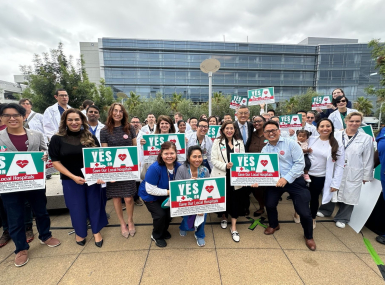Zika virus puts county mosquito control programs in spotlight
Upcoming Events
Related News

A Chatham County, Ga. mosquito control technician prepares for a flight to apply pesticide to manage the local mosquito population. Photo courtesy of Chatham County Mosquito ControlZika virus comes at a time when some mosquito control programs have folded
For county mosquito control professionals, the fog of war can have a faint chemical smell.
The work these warriors do — year round in some climates — has been in the spotlight since the arrival of the Zika virus infections in the United States.
Travel-related cases have been recorded in Los Angeles County, Calif., Lee County, Fla. and Harris County, Texas, among others. Florida Gov. Rick Scott declared a health emergency in Miami-Dade, Lee, Hillsborough and Santa Rosa counties, Feb. 3.
The virus is spread to people through mosquito bites, but Dallas County, Texas recently confirmed the first case in the United States that was sexually transmitted between intimate partners, one of whom was infected.
“This is a game-changer,” according to Zachary Thompson, director of Dallas County Health and Human Services. “Now we (also) have to talk about safe sex practices….”
The arrival of the Zika virus comes at a time when some mosquito control programs have folded, according to Jeff Heuser, director of mosquito control for Chatham County, Ga., where the American Mosquito Control Association (AMCA) happens to be holding its annual conference in Savannah, Feb. 7–11. Zika virus won’t dominate the agenda, but at least two sessions will focus attention on the issue.
Farther south, the Florida Keys Mosquito Control District has a “very aggressive” program in place to control aedes aegypti, the type of mosquitoes that transmit Zika virus, said Beth Ranson, public education and information officer. The agency is a special taxing district that serves all of Monroe County — from the Everglades on the mainland to Key West — with a budget of about $10 million annually.
She said their vector control program “never really came off high alert” after an outbreak of dengue in 2009 and 2010. “What we do day-to-day, operationally, is more than what most districts or countries do,” she said. “We have boots on the ground that go door-to-door inspections of property, and we try to get to every property at least once a month.”
Nationwide, there are about 720 named mosquito control districts, according to Joe Conlon, the ACMA’s technical expert, and they spent about $235 million in 1999, the last year for which reliable data are available.
Adding to those costs, he said, are federal regulations. In 2009, in National Cotton Council of America, et al. v. U.S. EPA, the 6th U.S. Circuit Court of Appeals overruled the EPA and held that the Clean Water Act requires discharge permits for the application of pesticides for mosquito control “in, above or near” a “water of the United States.”
Conlon contends that the time spent on filing reports could be better used fighting mosquitoes. “We’re generating enormous amounts of data and whatnot that are sitting on someone’s desk in Washington,” he said, “but it’s taking us time and resources to compile all of this stuff.”
That hasn’t been a problem for Chatham County, said Heuser, whose program has an annual budget of $3.8 million and an arsenal including three helicopters and a fixed-wing aircraft. “We have always kept extremely good records on what we do, so from the standpoint of having to document what we’re doing, it didn’t cause us a lot of problems.”
But he said reporting requirements can be a burden for smaller programs, a number of which have closed up shop in recent years. The economic downturn was a factor, he said, “But in that economic downturn there were associated costs such as the reporting requirements of the NPDES.”
He noted that many mosquito control programs were started with seed money from the Centers for Disease Control, back when West Nile virus began to spread in the United States. Once the money ran out, there was, in some cases, no local funding to sustain operations.
Diane Weems, M.D., health director for Georgia’s coastal district, added, “The funding and capacity of those vector control agencies from county to county varies greatly and that does depend on county funding.” The state has 159 counties.
“I would love to see several more mosquito control organizations, operations pop up here in Georgia,” said Heuser, who is also president of the Mid-Atlantic Mosquito Control Association.
At the county level, public health officials see an opportunity in the Zika outbreak: “I think the key message for government officials and county officials is really just to remind people why it’s so important to invest in public health and (disease) surveillance,” said Umair Shah, M.D., health director for Harris County, Texas.
Thompson, his colleague in Dallas County, echoed that message. “Hopefully there’ll be more funding for vector control programs throughout the United States as we move more into these emerging viruses,” he said. “I think that has to still be our number one priority.”
Weems called mosquito control “a real vital partner to what we do in public health.”
“A lot of our focus is on prevention, messaging, on guidance and surveillance of human cases and keeping data related to human cases. But we cannot work without mosquito control, so we consider them a very key partner.”

Inspectors search for breeding sites in the Florida Keys. Photo courtesy of Florida Keys Mosquito Control District.
Attachments
Related News

CMS issues new guidance on Medicaid Community Engagement Requirements
On December 8, the Centers for Medicare & Medicaid Services (CMS) released a Medicaid and CHIP Services Informational Bulletin (CIB) directing states on how to implement the Medicaid community engagement requirements enacted under Section 71119 of the One Big Beautiful Bill Act legislation (Public Law 119-21), or H.R. 1.

California county sales tax measure backfills federal healthcare cuts
Santa Clara County, Calif. will raise an estimated $330 million each year from a sales tax to backfill lose Medicaid funding.
